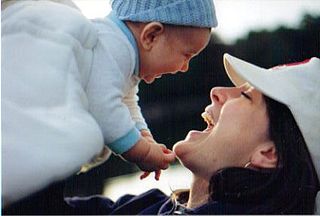Related Research Articles
In the field of psychology, cognitive dissonance is described as the mental disturbance people feel when they realize their cognitions and actions are inconsistent or contradictory. This may ultimately result in some change in their cognitions or actions to cause greater alignment between them so as to reduce this dissonance. Relevant items of information include peoples' actions, feelings, ideas, beliefs, values, and things in the environment. Cognitive dissonance is typically experienced as psychological stress when persons participate in an action that goes against one or more of those things. According to this theory, when an action or idea is psychologically inconsistent with the other, people do all in their power to change either so that they become consistent. The discomfort is triggered by the person's belief clashing with new information perceived, wherein the individual tries to find a way to resolve the contradiction to reduce their discomfort.

An attitude "is a summary evaluation of an object of thought. An attitude object can be anything a person discriminates or holds in mind." Attitudes include beliefs (cognition), emotional responses (affect) and behavioral tendencies. In the classical definition an attitude is persistent, while in more contemporary conceptualizations, attitudes may vary depending upon situations, context, or moods.

Philip George Zimbardo is an American psychologist and a professor emeritus at Stanford University. He became known for his 1971 Stanford prison experiment, which was later severely criticized for both ethical and scientific reasons. He has authored various introductory psychology textbooks for college students, and other notable works, including The Lucifer Effect, The Time Paradox, and The Time Cure. He is also the founder and president of the Heroic Imagination Project.
Emotional reasoning is a cognitive process by which an individual concludes that their emotional reaction proves something is true, despite contrary empirical evidence. Emotional reasoning creates an 'emotional truth', which may be in direct conflict with the inverse 'perceptional truth'. It can create feelings of anxiety, fear, and apprehension in existing stressful situations, and as such, is often associated with or triggered by panic disorder or anxiety disorder. For example, even though a spouse has shown only devotion, a person using emotional reasoning might conclude, "I know my spouse is being unfaithful because I feel jealous."

Mary Cover Jones was an American developmental psychologist and a pioneer of behavior therapy, despite the field being heavily dominated by males throughout much of the 20th century. Joseph Wolpe dubbed her "the mother of behavior therapy" due to her famous study of Peter and development of desensitization.
Michael S. Gazzaniga is a professor of psychology at the University of California, Santa Barbara in the USA, where he heads the new SAGE Center for the Study of the Mind. He is one of the leading researchers in cognitive neuroscience, the study of the neural basis of mind. He is a member of the American Academy of Arts & Sciences, the Institute of Medicine, and the National Academy of Sciences.
Leda Cosmides is an American psychologist, who, together with anthropologist husband John Tooby, pioneered the field of evolutionary psychology.

Affect, in psychology, is the underlying experience of feeling, emotion, attachment, or mood. It encompasses a wide range of emotional states and can be positive or negative. Affect is a fundamental aspect of human experience and plays a central role in many psychological theories and studies. It can be understood as a combination of three components: emotion, mood, and affectivity. In psychology, the term affect is often used interchangeably with several related terms and concepts, though each term may have slightly different nuances. These terms encompass: emotion, feeling, mood, emotional state, sentiment, affective state, emotional response, affective reactivity, disposition. Researchers and psychologists may employ specific terms based on their focus and the context of their work.

Peter Salovey is an American social psychologist and academic administrator. He served as the 23rd president of Yale University from 2013 to 2024. He previously served as provost of Yale University from 2008 to 2013, dean of Yale College from 2004 to 2008, and dean of Yale Graduate School of Arts and Sciences from 2003 to 2004. Salovey is one of the early pioneers in emotional intelligence.
Cross-cultural psychology is the scientific study of human behavior and mental processes, including both their variability and invariance, under diverse cultural conditions. Through expanding research methodologies to recognize cultural variance in behavior, language, and meaning it seeks to extend and develop psychology. Since psychology as an academic discipline was developed largely in North America and Europe, some psychologists became concerned that constructs and phenomena accepted as universal were not as invariant as previously assumed, especially since many attempts to replicate notable experiments in other cultures had varying success. Since there are questions as to whether theories dealing with central themes, such as affect, cognition, conceptions of the self, and issues such as psychopathology, anxiety, and depression, may lack external validity when "exported" to other cultural contexts, cross-cultural psychology re-examines them using methodologies designed to factor in cultural differences so as to account for cultural variance. Some critics have pointed to methodological flaws in cross-cultural psychological research, and claim that serious shortcomings in the theoretical and methodological bases used impede, rather than help the scientific search for universal principles in psychology. Cross-cultural psychologists are turning more to the study of how differences (variance) occur, rather than searching for universals in the style of physics or chemistry.
Michael A. Hogg is a British psychologist, and Professor of Social Psychology in the Department of Psychology at Claremont Graduate University in Los Angeles. He is also an honorary Professor of Social Psychology at the University of Kent in the UK.
Thomas J. Scheff is an American Professor, Emeritus, Department of Sociology at University of California, Santa Barbara. His fields of study are the emotional/relational world, mental illness, restorative justice, and collective violence. He holds a BS from the University of Arizona in Physics (1950), and a PhD in sociology from the University of California (Berkeley) (1960). He was at University of Wisconsin from 1959–63, when he joined the faculty at the University of California, Santa Barbara.
Sidney William Bijou was an American developmental psychologist who developed an approach of treating childhood disorders using behavioral therapy, in which positive actions were rewarded and negative behaviors were largely ignored, rather than punished.
Wendy Berry Mendes is the Charles C. & Dorathea S. Dilley Professor of Psychology at Yale University. She was previously the Sarlo/Ekman Professor of Emotion at University of California, San Francisco, United States and prior to that position was the John L. Loeb Associate Professor of Social Sciences at Harvard University. Her expertise is in the area of emotion, intergroup relationships, stigma and psychophysiology. At Yale she is the founder and director of the Emotion, Health, and Psychophysiology Lab in the Department of Psychology.
Calvin Springer Hall, Jr., commonly known as Calvin S. Hall, was an American psychologist who studied in the fields of dream research and analysis. He began his systematic research on dreams in the 1940s, and from there he wrote many books, A Primer of Freudian Psychology and A Primer of Jungian Psychology being the best known, and developed a quantitative content analysis system for dreams. Hall's work on temperament and behavior genetics is now only a historical footnote, but was an aid to scientific studies and theories of today.
Wendy Wood is a UK-born psychologist who is the Provost Professor of Psychology and Business at University of Southern California, where she has been a faculty member since 2009. She previously served as vice dean of social sciences at the Dornsife College of the University of Southern California. Her primary research contributions are in habits and behavior change along with the psychology of gender.

Place attachment is the emotional bond between person and place, and one way of describing the relationship between people and spatial settings. It is highly influenced by an individual and his or her personal experiences. There is a considerable amount of research dedicated to defining what makes a place "meaningful" enough for place attachment to occur. Schroeder (1991) notably discussed the difference between "meaning" and "preference," defining meaning as "the thoughts, feelings, memories and interpretations evoked by a landscape" and preference as "the degree of liking for one landscape compared to another."

Jonathan Schooler, is an American psychologist and Distinguished Professor of Psychological and Brain Sciences at the University of California, Santa Barbara, who researches various topics that intersect aspects of both cognitive psychology and philosophy such as: Belief in free will, Meta-awareness, Mindfulness, Mind-Wandering, Memory, Creativity, and Emotion. Schooler is also known for his sometimes controversial research on topics such as Anomalous Cognition and the decline effect.
Attitude Reconstruction: A Blueprint for Building a Better Life is a book written by American author and psychotherapist Jude Bijou, MA, MFT. This book has received multiple awards including 2012 Winner of ForeWord Review in both psychology and self-help, the 2012 Benjamin Franklin Award in self-help, and the 2012 Nautilus Silver Award in personal growth/psychology. Its content is widely used by individuals, couples and groups as well as within therapeutic settings by licensed professionals. Attitude Reconstruction: A Blueprint for Building a Better Life proposes that unexpressed sadness, anger, and fear are the root causes of all negative attitudes and perceived problems.
Stanley Keleman was an American writer and therapist, who created the body psychotherapy approach known as "formative psychology". He was one of the leaders of the body psychotherapy movement nationally and internationally. His methodology rested on an anatomical base and incorporates an evolutionary, philosophical and mythological perspective; within this formative paradigm the human is capable of learning voluntary self-influence of instinctual and emotional expression as a way to manage dilemmas of daily living and to form personal choices for creating a future. Keleman started developing and articulating his concepts in 1957. In 1971, he published the first of 10 books.
References
- 1 2 3 "Member profile". Santabarbaratherapy.org. Retrieved 2013-12-04.
- ↑ "How to Be Happy at Work - On Careers (usnews.com)". Money.usnews.com. 2013-10-30. Retrieved 2013-12-04.
- ↑ Sidney Bijou